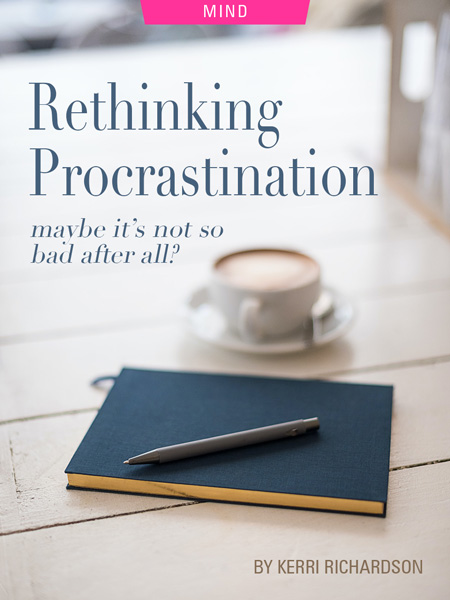Estimated reading time: 7 minutes
A surprising take on procrastination — how to use it, not be used by it — and clear up the mind-clutter in the process
—
Writing a second book should be much easier than writing your first, right? After all, you know what it takes so it should be a breeze. Oh, how I wish that was the case for me, but alas it was just the opposite.
Back in 2017 when I wrote What Your Clutter Is Trying to Tell You, it came out surprisingly easy. In fact, I wrote the entire thing in about eight weeks. Granted it’s a relatively short book, but putting it together was quick and, dare I say, fun.
Fast forward to the end of 2019 when the deadline for my new book, From Clutter to Clarity: Clean Up Your Mindset to Clear Out Your Clutter was racing toward me like a freight train. I tried all the tricks:
I set up a nice spot where I could write,
I schedule specific hours in my week dedicated to book writing,
I scoured decades worth of blog posts to pull from, and
I processed my writer’s block with trusted family and friends.
Still, I could barely get the wheels in motion. I’d have successful moments but most of the time I sat staring at the blinking cursor praying for inspiration.
I had some serious resistance getting in the way. I tried ignoring it. I tried negotiating with it. I tried clearing it. To describe it as stubborn wouldn’t do it justice, so I had no choice but to sit with it quietly and listen.
In it I heard young Kerri’s fears:
“What if this one isn’t as good as the first one?”
“What if this one doesn’t hit the bestseller’s list? Will my publisher/family/I be disappointed?”
“What if people find out I’m really a fraud pretending to know my stuff?”
“Who do I think I am to write another book?”
Blah blah blah.
I’m sure you can relate to some of those with whatever mountain you’re trying to climb.
It was time to take my own advice. Instead of trying to push through, I needed to work on clearing the mental clutter. I grabbed my journal, wrote those questions down and answered them with whatever poured out of the pen.
I didn’t overthink.
I didn’t try to drum up some big ‘ah-ha’ moment. I just wrote.
And I was reminded why I recommend this to my students and members all the time.
You see, it didn’t matter what I wrote in response to those fears. What mattered was honoring them enough to hold space for them. Shutting them down wasn’t working. Attempting to do so only made them louder. Once I acknowledged them, the chatter became less frequent. Once I validated them, they quieted down big time.
Did they perk back up every now and then? Sure, but I knew how to respond. While the book didn’t come together seamlessly as a result of this, the duration of any blocks shortened significantly.
We often write off procrastination to being lazy when, in fact, it’s a form of protection…
…as evidenced by the fears that young Kerri was squawking about as I wrote.
Below is an excerpt from my new book, From Clutter to Clarity, where I explain more:
If you know that small steps are key, yet you still have trouble taking them, where do you turn? What could be stopping you? The culprits are likely one of two things (things that happen to be the best of friends): procrastination and perfectionism. Both cause us to protect ourselves, but more often than not, they feel like deep character flaws that are impossible to overcome.
Procrastination convinces you that another day will be better. “I’ll wait until I have a free weekend before I tackle that project.” Then the weeks go by, and as you fill up your days, you leave little time to focus on what really matters.
Perfectionism keeps the bar too high, so you give yourself an easy out. “I can’t complete this step, so why bother doing any of it?” This is a toxic way of thinking. Some progress is better than no progress, and a failed attempt is better than no attempt at all. And yet, the unrealistic expectations we have of ourselves keep both procrastination and perfectionism in our lives, serving as protectors of our self-doubt.
Consider the source of this self-doubt. It could be any one of the following: a fear of failure; a fear of success; a big step you have to overcome; someone else’s high expectations of you; the possibility that, once finished, you might still not be happy; or any other source of anxiety in your life.
The best way to figure out what you’re avoiding is by taking action.
Start by looking at your next step and breaking it down. Keep breaking it down into smaller and smaller pieces until the step is so small that it takes more energy to avoid it than to complete it.
For example, let’s say you’ve been procrastinating going through your teenage children’s baby clothes. The task feels daunting and overwhelming. Do you donate them? Offer them to friends? What if you struggle to part with them at all?
These questions can easily stop you in your tracks if you let them. Instead, you can discover the answers to them by getting started. Maybe you begin with sorting just one bin into three piles: Keep, Donate, Friends. If that still feels too difficult, consider looking only for those items you are ready to part with. Any maybes stay for now. Still stuck? Grab your journal and write about how you feel at the idea of letting these items go.
When you stir the pot in this way, the true clutter rises to the surface. By digging in and getting started, it’s almost as if you gently poke your resistance, waking it up so it can start chattering and tell you why it would rather you leave things alone. This is when you begin to uncover the message in the mess.
Procrastination’s Payout
If you still find yourself avoiding the task even after breaking it into pieces, it’s time to dig deeper. There is something bigger you’re scared of. Even if you know you’d be much happier, relieved, or excited with the project done, there is something more appealing about leaving it undone.
Open your journal and ask yourself this question: “How am I benefitting from putting things off?” This question may sound ridiculous, but there must be a payout to procrastinating, otherwise you wouldn’t be doing it. You might come up with answers like:
If I complete this, people will expect more of me.
I’m scared of the emotions this could stir up.
I’m not smart enough to figure this out.
What if I mess up and disappoint people?
It can be hard to face these truths. It’s okay. Remember: the key is to start somewhere and to be kind to yourself as you do.
This is also a great example of a super small step you can take whenever you feel stuck. Super small steps are exactly that: super small and super easy. They don’t need to be direct action related to the project you’re procrastinating on. Sometimes, the clutter we need to clear first is our resistance. Play it out. Give it space to breathe. Humor it. That could be all it needs to get out of your way.
—
The next time you’re dragging your feet, consider how you might be protecting yourself. What small steps can you take to dip a toe outside of your comfort zone so you can show your younger self that all is well? At the very least, you can learn from my mistakes and start by not beating yourself up for procrastinating!
You may also enjoy reading The Art of De-Cluttering: A Tiny House Creates A Surprising Catalyst for Expansion by Kerri Richardson

